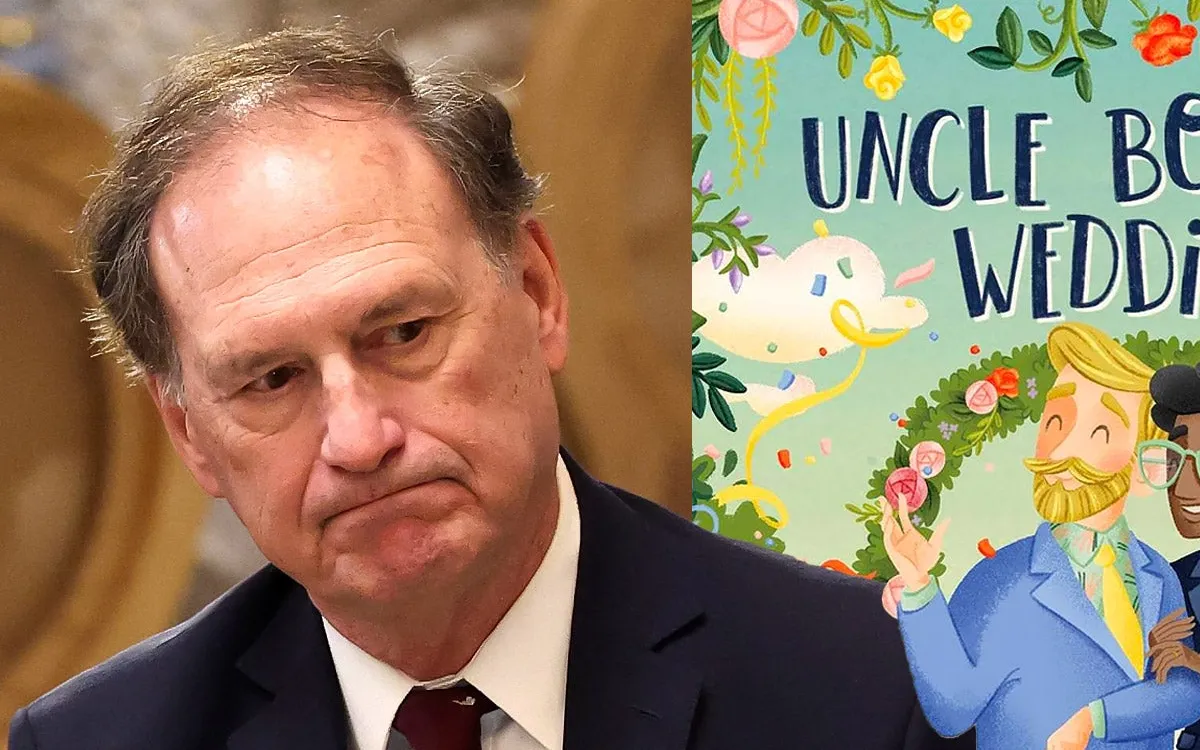
On Tuesday, the Supreme Court's conservative justices engaged in a heated debate regarding the implications of various LGBTQ-themed children’s books, revealing a disturbing undercurrent of homophobia. During the case of Mahmoud v. Taylor, these justices expressed concerns and, in some instances, outright disgust towards literature portraying LGBTQ+ individuals as normal and loving members of society. Their discussions centered around the notion that parents possess a First Amendment right to shield their children from such material in public schools, allegedly to protect them from the realities of diverse family structures, all while invoking the principle of religious liberty.
Justice Samuel Alito singled out the book Uncle Bobby’s Wedding, a gentle picture book that faced attempts at censorship by homophobic parents upon its release in 2008. Alito suggested, despite Justice Sonia Sotomayor's objections, that the book serves as devious propaganda intended to indoctrinate children who may have reservations about same-sex marriage. This assertion was not only inaccurate; it fundamentally misrepresented the essence of the book. Author Sarah Brannen emphasized that the narrative is crafted in simple language, accessible to young children. She speculated that Alito's interpretation was deliberately misleading, part of a broader attempt to vilify both the school board and same-sex families.
The heart of this case lies in the justices' portrayal of woke educators as insidious figures indoctrinating children with radical pro-LGBTQ+ values, seemingly in violation of parents' religious beliefs. The Republican-appointed justices expressed a readiness to grant parents a veto over classroom materials, aiming to prevent their children from learning about LGBTQ+ families. This stance raises significant concerns about the damaging message of censorship that it sends to children who belong to those very families.
Brannen wrote and illustrated Uncle Bobby’s Wedding in 2005, shortly after same-sex marriage was legalized in Massachusetts. Following its publication, the book faced numerous challenges due to parental objections, becoming the eighth most challenged book in the United States that year. In 2022, the Montgomery County Board of Education decided to include it in their curriculum, prompting some religious parents to opt their children out of reading the book. Eventually, the board scrapped the opt-out policy due to its unmanageable nature, as it led to an overwhelming number of objections that disrupted the educational process. Subsequently, these parents initiated a lawsuit, claiming their First Amendment rights were violated by being denied the opportunity to protect their children from LGBTQ+ literature.
During the Supreme Court arguments, Justice Sotomayor raised questions about how “mere exposure” to same-sex marriage could elicit a religious objection. She pointed out that “none of them are even kissing,” highlighting the absurdity of the plaintiffs' claims. Alito, however, interjected, asserting that the book merely exposes children to the fact of same-sex marriage. He proceeded to mischaracterize the book's message, arguing that it teaches children to dismiss any reservations they may have about same-sex unions.
Justice Sotomayor's intervention was notably assertive, challenging Alito’s claims directly—a rare occurrence in Supreme Court discussions. She pointed out that the character Chloe’s reservations were not about Uncle Bobby's sexual orientation but stemmed from her concern that he would have less time for her post-marriage. This critical distinction was lost on Alito, who continued to insist that the book subtly promoted the idea that same-sex marriage is inherently positive.
In a follow-up conversation, author Sarah Brannen confirmed Sotomayor’s interpretation, stating that no character in the book opposes same-sex marriage. Instead, Chloe's journey reflects the challenges children face when family dynamics change. Brannen intended to convey a timeless message about open-mindedness and the adaptation to change, presenting a gay wedding as a normal event within the story’s context.
While Alito’s literary misrepresentation may seem trivial, it underscores the core issues at stake in the Mahmoud case. The plaintiffs frame children’s literature like Uncle Bobby’s Wedding as propaganda aimed at brainwashing their children into supporting LGBTQ+ rights. Yet, these books merely reflect the existence of LGBTQ+ families in real life. The question remains: Is it truly propaganda to depict a family with two moms shopping at a grocery store, or a transgender dad playing with his son at the park? Should a public education system be expected to cater to extreme beliefs that reject the reality of diverse family structures?
The Montgomery County Board of Education adopted LGBTQ+ inclusive literature to represent the diversity of its student body. It is vital for children of LGBTQ+ parents to see themselves in classroom literature. Excluding such representations not only discriminates against these families but also sends a harmful message to their children that their existence is somehow unacceptable. Brannen expressed her deep concern that if the plaintiffs prevail, the ruling could enable discrimination against LGBTQ+ families nationwide. Allowing children to opt out of learning about these families or removing such materials entirely could suggest to young students that there is something inherently wrong with their family structure.